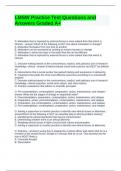Exam (elaborations)
LMSW Practice Test Questions and Answers Graded A+
- Course
- Institution
LMSW Practice Test Questions and Answers Graded A+ D. Motivation that is imposed by external forces is more salient than that which is intrinsic Which of the following is NOT true about motivation to change? A. Motivation fluctuates from one time to another B. Motivation can be increased by wor...
[Show more]



